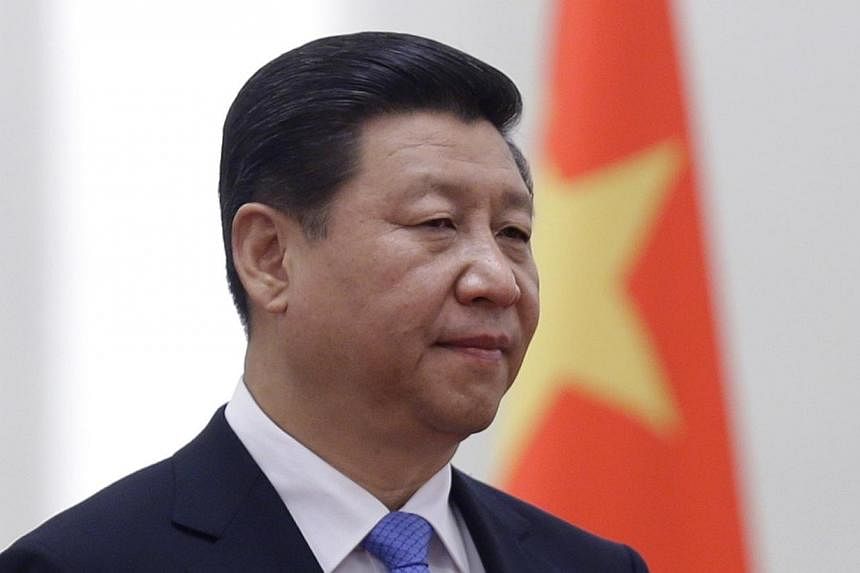BEIJING (AFP) - China's President Xi Jinping is emerging as the country's most powerful leader in decades, analysts said, after the declaration of a probe into the country's former security chief, as state media on Wednesday hailed the ground-breaking move.
Mr Zhou Yongkang wielded control of China's police, courts, jails and domestic surveillance until his retirement from the elite Politburo Standing Committee in 2012.
But the ruling Communist Party's internal watchdog finally made public its long-rumoured investigation into him on Tuesday.
By taking down Mr Zhou, Mr Xi breaks a decades-old unwritten taboo against punishing current and former members of the party's innermost circle - a move experts say suggests a leader on track to amass more power than those of recent decades.
Less than two years after taking office, Mr Xi was "very well entrenched", said Mr Willy Lam, an expert on Chinese politics at the Chinese University of Hong Kong. "For the rest of his eight-year term I think he will become the strong man, he will become likely much more powerful than his predecessors."
As well as the standard offices of a Chinese leader - head of the ruling party, the government and the military - Mr Xi has placed himself at the head of several committees previously led by other figures, and a new and much-touted national security committee.
He has done so while navigating his way through the faction-ridden upper echelons of the ruling party.
Analysts see Mr Zhou's takedown as part of an effort by Mr Xi and his allies to root out those who might challenge their hold on power.
Among Mr Zhou's proteges was Bo Xilai, the ambitious and charismatic politician whose spectacular fall from grace two years ago came after he became viewed as a threat to the ruling elite.
"It is certainly a very important signal that Xi Jinping is in charge, he can go after anyone within the party," said Professor Joseph Cheng, professor of political science at City University of Hong Kong.
"In contrast to Hu Jintao, his predecessor, he is not a first among equals and he has been gradually emerging as the most powerful leader in China."
China's state-run newspapers, barred for months from making even oblique references to Mr Zhou, on Wednesday blasted news of the probe across their front pages, with one featuring a large picture of a tiger - a nod to Mr Xi's pledge to root out high-ranking "tigers" as well as low-level "flies" in his much-publicised anti-graft sweep.
"This is the highest-ranking official ever to be probed since China's founding," proclaimed the Communist Party's mouthpiece newspaper, the People's Daily.
Mr Zhou, the influential daily added, "is no longer a comrade".
Some analysts see Mr Xi as intent on amassing more power than anyone since Mao Zedong, the founding father of the Communist Party.
Mr Xi has been promoted in China's state-run media more than any other leader since Mao, according to University of Hong Kong researchers.
The People's Daily mentioned Mr Xi by name on its front page 1,311 times during his first 18 months in power, their study found, compared to 1,411 times for Mao during the 18 months after the 9th party congress in 1969.
Mr Xi "would like to be another Mao Zedong, but I think it's very risky, because he's not another Mao Zedong", said Professor Perry Link, a professor at the University of California, Riverside, and a renowned China scholar.
"He's kind of trapped in his own rhetoric," Prof Link said. "If he backs down (on the anti-corruption campaign), one can be sure, I think, that his rivals will pounce on his backing down."
Institutionally, the party has stressed collective leadership and baulked at personality cults since the excesses of Mao, who led the country into the tumultuous destruction of the Great Leap Forward and the Cultural Revolution.
Kerry Brown, author of The New Emperors: Power and the Princelings in China, dismissed the possibility of a personality cult emerging around Mr Xi.
"All these people have memories of the Maoist period," he said.
"The thing that's really strong is the party - the infrastructure of the party," he added, noting that as a figure with his own "private fiefdom", Mr Zhou had become "a source of political risk".
The Chinese authorities have cast the probe as a triumph of the "rule of law", a notion that party leaders plan to emphasise at their next key meeting in October, known as the Fourth Plenum.
But China does not have an independent judiciary and experts were dismissive.
"What 'rule of law' means for them is putting up hoops and procedures and pretending that it is an independent system of law," Prof Link said.
"Rule One for the Communist Party - since the 1920s - is to gain power and maintain power."
Ms Sophie Richardson, China director for Human Rights Watch, pointed out that Zhou was deeply implicated in Chinese rights abuses going back years, and his victims would have no opportunity to bring action against him or those who carried out his orders.
"The leadership's imperative, as past cases have shown, will be to prosecute Zhou in a way that serves their political aims, which means creating an impression of combating corruption."

